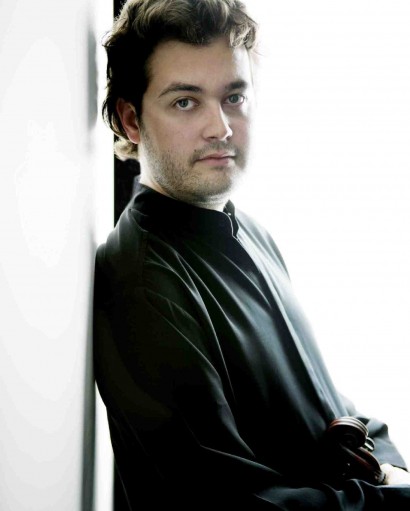Elder, CSO brush up on Berlioz’s Shakespeare, brilliantly

Sir Mark Elder has been one of the Chicago Symphony Orchestra’s most reliably effective guest conductors in recent seasons, and Thursday night at Orchestra Hall, Elder opened the CSO’s new year with an offbeat musico-theatrical evening devoted to Berlioz.
The British conductor’s two January programs will explore musical settings inspired by Shakespeare’s dramas, with music of Berlioz followed next week by works of Delius, Elgar and Tchaikovsky.
Elder always manages to bring a fresh, thoughtful approach to his CSO events both musically and logistically. As with his previous CSO stands, Elder reconfigures the players’s seating with violins split, violas right and cellos inside left with basses behind, which produces a darker and richer, if not always evenly projected corporate sound.
The conductor also provided an imaginative presentation. Elder himself offered interesting historical background, reading extensively, in his resonant BBC voice, from Berlioz’s rather overheated writings of how his first encounter with Shakespeare’s play was “like a bolt of lightning” that sparked the composer’s creative inspiration.
More to the point, two actors from Chicago Shakespeare Theater prefaced a pair of excerpts from the French composer’s “symphonie dramatique,” Romeo et Juliette with dramatized readings from the play. The twist is that it was not the usual Shakespeare urtext but the version Berlioz actually heard in Paris, retooled by actor-producer David Garrick. This version included a few dubious “improvements” like Juliet awakening at Romeo’s entrance and Garrick inserting a dramatic dialogue before his death.
Susan Shunk and Brendan Marshall-Rashid brought clarity and expressive power to the final scene, somewhat mitigated by a bit of distortion in the otherwise well-judged amplification. But most striking was Marshall-Rashid’s extraordinary rendering of Mercutio’s Queen Mab scene, delivered with a dramatic force and calibrated expression that was wholly musical itself.
In previous CSO appearances, Elder has demonstrated his mettle in Elgar and Dvorak, but his supremely sympathetic conducting Thursday night revealed him as one of our very finest Berlioz interpreters.
Elder drew playing of striking refinement and dynamic subtlety with a feather-light rendering of Berlioz’s Queen Mab scherzo and a stately, elegiac account of the tomb scene punctuated by Stephen Williamson’s piercing clarinet chords.
“There’s nothing here for me to do,” was Paganini’s response to Berlioz when presented with the score of Harold in Italy. Not quite the showy concerto Paganini desired to show off his new Stradivarius viola, Berlioz’s large-scale Byronic canvas is more of a symphony with viola obbligato, the solo passages more inward than brilliant and on slightly less-than-equal terms with the orchestra.
That said, soloist Lawrence Power delivered the most poetic and compelling performance of this wayward work that I’ve ever encountered. The young English violist brought a confiding intimacy and dizzying range of expression from the conversational playfulness of the opening theme to the hushed tranquility at the end of the second movement. Throughout the rambling four movements, Power conjured an array of unearthly colors from his remarkable instrument, a 1610 Antonio Brensi.
The surging, kaleidoscopic symphonic tapestry provided by Elder and the CSO was on the same inspirational level, Elder understanding that the key to Berlioz is not speed, volume or massed weight but transparency, dynamic alertness and rhythmic acuity.
The evening led off with a breezy and gleaming account of Berlioz’s Corsair Overture. As with Harold in Italy, Elder’s dexterous balancing and refined textures gave us a rendering both elegant and exhilarating.
The program will be repeated 8 p.m. Friday and 7:30 p.m. Tuesday. cso.org; 312-294-3000.
Posted in Uncategorized



Posted Jan 15, 2012 at 7:36 pm by chrisitna
For Sir Mark Elder: Sat Jan 14 8pm performance.
I was taken away with your performance. The orchestra trigger deep emotions and allowed certain memories to surface. My seat was behind the orchestra so I had a front view of you and this experience was indescribable! Your expression drove not only the performance however it also drive me to reach dimensions mentally like never before. Thank you Sir Mark Elder.